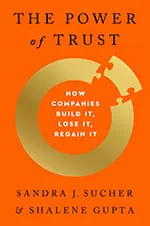
When Facebook failed to protect the privacy of 87 million people whose data was harvested without their consent in 2015, the company not only circumvented data privacy regulations, it breached the public’s trust. And by failing to seriously reckon with the ensuing wave of anger, “Facebook has blown it,” says Harvard Business School Professor Sandra Sucher.
By contrast, she notes, when Pinterest proactively moved to keep anti-vaccination activists from spreading misinformation on the site during the COVID-19 pandemic, the company made great strides in preserving the faith of its users.
In the new book The Power of Trust: How Companies Build It, Lose It, Regain It, Sucher and her coauthor, HBS research associate Shalene Gupta, highlight those social media examples along with a global list of companies that have either successfully earned the trust of consumers or have made a mess of it.
What we want from a company today is not the same as 10 years ago. But the principles are the same.
Companies need to do a better job of earning trust, the authors say. The Edelman Trust Barometer, an annual survey of 34,000 people in 28 countries, showed in 2018 that trust in business varied between 43 and 53 percent during the previous decade. While trust in business in the 2021 barometer [pdf] increased to 61 percent, the majority of those surveyed did not deem CEOs as credible, nor did they trust them to do what is right.
To turn that picture around, business leaders must establish trust with customers, employees, and investors by being “the real deal,” creating valuable products and services, acting on good intentions, treating people fairly, and taking responsibility for how an organization impacts business and society, the authors write. And, at a time when the US political landscape is bitterly divided and the COVID-19 pandemic has shaken the economy and led to widespread job losses globally, a corporate focus on trust may be more important than ever, Sucher says. She has studied corporate trust for two decades, serves on the Edelman Trust Institute advisory board, and has collaborated with Deloitte on TrustIQ, a proprietary tool that measures key elements of trust in major corporations and public sector organizations.
“An increasingly large number of issues are piling up in front of companies, issues that people use to determine if they trust a company,” she says. “What we want from a company today is not the same as 10 years ago. But the principles are the same.”
The elements of trust
A handful of companies stand out as rare examples of building an unwavering sense of trust, Sucher and Gupta say. The Ritz-Carlton Hotel Company, for example, is known for providing a warm, welcoming, personalized experience at every level, from executives and managers to housekeeping and wait staff. And Patagonia has demonstrated its pro-environment stance by continually re-examining its practices—from selling organic cotton and eco-friendly synthetic apparel to investigating its own supply chain for worker exploitation.
The authors say companies that are adept at building trust focus on four key elements:
Competence: While every company needs to be competent—capable of creating and delivering products and services with technical know-how and managerial smarts—“competence alone is never enough” to ensure trust, Sucher says. The other three elements need to be considered.
Motive: Customers are intent on understanding a company’s motive: why they do what they do, and whose interests they serve beyond their own balance sheet. “A lot of scandals have emerged because the goals conflict,” Sucher says.
Means: A company’s means are not merely its business methods, but whether it takes “the fair path to get there,” Sucher says, in creating equitable practices for employees and communicating with the public.
Impact: The overall effect of a company’s practices and actions. As a whole, are those impacts positive or negative?
Ultimately, if a company is making a bad impact, however unintended, Sucher and Gupta say the public looks to a company to own up to the harm it has caused, starting with a willingness to apologize. And the apology should be offered to employees as well as customers and the general public.
“It’s shocking the number of companies that don’t apologize,” Gupta says. “They think it’s an admission of guilt.”
Losing trust
The list of companies struggling with trust issues is long. Uber, for example, lost trust in 2017 when company officials were accused of sexual harassment and other abusive treatment of employees. Plus the ride-sharing service was “flat-out wrong” to try and poach drivers from its competitor, Lyft, in 2014, Sucher says. The company has made some good-will gestures, such as giving people free rides to get COVID-19 vaccinations, but, Sucher says, “there is such an overhang of bad conduct. It’s going to take an amazing amount of work to fully regain trust.”
The challenge is that it takes a sustained history of right to wipe out one wrong.
Wells Fargo is also still repairing the damage from a massive fake-account scandal that surfaced in 2016. Volkswagen is trying to recuperate from the 2015 rigged-emissions revelations. And Boeing, once widely admired, has yet to recover from the 737 Max plane crashes in 2018 and 2019.
These companies will have to be patient. “The challenge is that it takes a sustained history of right to wipe out one wrong. A company will have to be on the right side of trust again and again,” Sucher says.
Lost trust often has financial consequences. An Economist magazine analysis of Volkswagen, Wells Fargo, and six other corporations calculated that a company loses 30 percent of its value when it loses trust, at least in the short term. Meanwhile, a 10 percent increase in trust leads to 0.8 percent more economic growth.
“People think trust is an airy-fairy concept that’s nice but not essential, and it’s not,” Gupta says. “It’s that moment when you take it for granted that problems start.”
Regaining trust
While some corporations still aren’t in the clear, Sucher says it’s possible to bounce back and points to Michelin as doing the right things to regain trust.
In 1999, the tire manufacturer mishandled a layoff and restructuring announcement so badly that it provoked labor protests and a federal law to prevent a repeat of “L’affaire Michelin.” Generations of trust evaporated. The company regained it with a 10-year turnaround and a commitment to closely collaborating with workers at every step.
Trust is something you can get better at. For companies that want to take this seriously, it can be done.
“Michelin wasn’t just being collaborative for the sake of being collaborative,” Sucher and Gupta write. “Its instincts were excellent.” Michelin is once again known for its restaurant ratings and iconic Michelin Man logo.
“Trust is something you can get better at,” Sucher says. “For companies that want to take this seriously, it can be done.”
About the Author
Lane Lambert is a writer based in the Boston area.
[Image: iStockphoto/vernonwiley]
How has a company tried to regain your trust after a misstep?
Share your thoughts in the comments below.
Book Excerpt## The Power of Trust: How Companies Build It, Lose It, Regain It
Sandra J. Sucher and Shalene Gupta

Impact: Our Actions Speak
We want to know companies operate from well-intentioned motives. However, that doesn’t mean that companies are necessarily off the hook if they cause harm …
We can see how it plays out in companies and industries from the 2019 Michelin Movin’ On transportation conference. It was held in Montreal, and business and government leaders and researchers and scientists who work on transportation came together to discuss ideas. Amid a colorful backdrop of circus performers putting on impromptu performances in the hallways, and panels interspersed with local singers and dancers giving mini shows, we attended a panel on the future of environmental sustainability.
There, a senior leader from a major oil and gas company discussed his company’s plan for environmental sustainability. He sounded great! He was well versed in the vocabulary and actions of the fight to save the environment, using terms like “clean energy” and “going green,” and discussed how his company was committed to sustainability goals. We nodded along happily because he sounded reasonable and we agreed with the goals his company had set. Yet at the same time, it was hard to know how seriously to take him and his company’s plans. After all, according to the Carbon Majors database, ninety companies have been responsible for over 63 percent of all carbon dioxide and methane emissions since 1751, while the top twenty polluters have been responsible for 29.5 percent of emissions.
Our relationship with a company is based primarily on how a company’s actions impact us and those around us.
After he spoke, there was silence. Someone asked a polite question about how he planned to implement the environmental sustainability goals, and he responded with an even more encouraging reply. Then someone from the audience went for the money: “Given the amount of damage your company and companies in your industry [have] created, why should anyone believe a word you’re saying?”
To the leader’s credit (and neither of us would have liked to be in his shoes), he answered a difficult question deftly by pointing out that because his industry had had such a large impact, it was in a prime position to lead the charge for reversing the damage. A good answer, but neither the audience member nor we were entirely satisfied. Good intentions could not erase the impact of past damage in our minds. In part, this is why some industries are judged more harshly than others—it’s hard to trust someone from an oil and gas company when they talk about saving the environment, or someone from a tobacco company when they talk about health, given how dangerous their products are to public and personal health.
However, most people don’t have a clear view into the internal motivations of a company. Instead our relationship with a company is based primarily on how a company’s actions impact us and those around us.
Excerpted from The Power of Trust: How Companies Build It, Lose It, Regain It by Sandra J. Sucher and Shalene Gupta. Copyright © 2021. Available from PublicAffairs, an imprint of Perseus Books, LLC, a subsidiary of Hachette Book Group, Inc.

